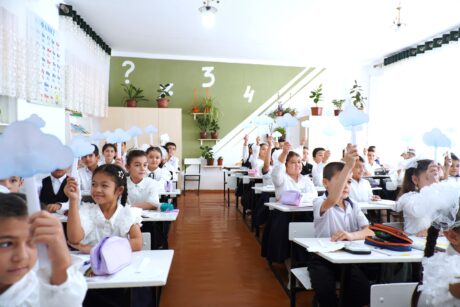
At its most fundamental level, inclusive education is about ensuring that all children, regardless of their abilities, have equal access to quality learning. This approach not only allows children with disabilities to learn alongside their peers but also enhances the educational experience for all students, fosters relationships among diverse learners, and promotes a sense of belonging and community integration. It’s a fundamental support for basic human rights.
No Uzbequistão, the Ministry of Preschool and School Education (MOPSE), the National Agency for Social Protection (NASP) and other education stakeholders are dedicated to implementing inclusive education nationwide, aiming for 51 percent of schools to adopt inclusive education models by 2025. This comes as a significant change from the segregated education system commonly seen in the region.
The USAID All Children Succeeding (ACS) atividade, implemented by Creative and a consortium of local and international partners, is working closely with the Government of Uzbekistan to facilitate this transition, with a focus on aligning educational practices, materials and community support with new inclusive education policies.
While changing policy is a huge first step in implementing inclusive education in Uzbekistan, the country faces an immediate need for teachers to gain pedagogical skills in a practice they have not previously used or experienced.
The inclusive education landscape in Uzbekistan
Historicamente, Uzbekistan’s education system, influenced by the Soviet model, offered limited options for families of children with disabilities: homeschooling or specialized, often residential, escolas. Children attending homeschooling or specialized schools experience varying quality of education, often with lower educational expectations and fewer opportunities following school completion for further education or entry into the workforce. This separation has led to highly segregated communities and perpetuated stigma and discrimination against persons with disabilities.
No entanto, em 2021, Uzbekistan took a large step toward integrating children with disabilities into the broader community and general education system when they ratified the Convention on the Rights of Persons with Disabilities, which notably recognizes the rights of children with disabilities to access mainstream education. In an effort to achieve greater inclusivity in education, the government committed to enrolling 40 percent of children with disabilities in general education schools.
In order to make this ambitious goal a reality, MOPSE must now address the critical role of teachers and support them to shift into this new mindset and model of inclusive education.
How do we help teachers now?
In a recent study on perceptions of disability and inclusive education in Uzbekistan conducted by local ACS partner Ascender, we found that while the majority of teachers acknowledge that inclusive education supports socialization and learning abilities of all children, apenas 45 percent believe that inclusive classrooms were the best format for children with disabilities.
Teachers in Uzbekistan have lived through a segregated system where children with disabilities were excluded from their classes. Avançar, 51 percent of teachers indicated that they would “feel terrible” if they had a disability. Portanto, shifting to an inclusive education system requires that we not only address teacher skillsets and pedagogical practices, but also behaviors and attitudes regarding disability.
ACS is tackling this challenge with a three-pronged approach to teacher development:
- Enhancing the pre-service teacher training program implemented by national and regional teacher training institutes
- Improving the in-service teacher professional development content overseen by MOPSE
- Providing immediate training to teachers who will welcome children with disabilities into their schools as soon as this year
To ensure the teacher training programs are contextually relevant and sustainable, ACS is working closely with MOPSE, Nizomi Tashkent State Pedagogical University, and Avloniy Research Institute to enhance Uzbekistan’s pre-service and in-service teacher training programs. Through careful review and revision of existing content, this collaboration aims to integrate best practices in inclusive education throughout theoretical and practical teacher training, preparing all teachers for diverse classrooms.
Given the urgency of the government’s 2025 goal, ACS has begun implementing cascade training with primary school teachers in Namangan and Syrdaryo, alongside mentors from across the country, to equip them with the practical skills and knowledge to immediately launch inclusive education. Including child-centered learning, universal design for learning, and positive communication and collaboration strategies, ACS is building on existing skills and extending those to serve children with disabilities.

In Aug. 2024, ACS trained 1,000 school principals and 10,000 professores from Namangan and Syrdaryo on inclusive education. Bringing together some of the strongest teachers from the two regions, ACS worked with MOPSE staff and 88 Master Trainers, all active primary school teachers, to help teachers gain practical skills to plan for and implement effective inclusive education lessons. Through collaborative learning, analyzing and writing lesson plans, observing and facilitating model lessons and active Q&A sessions, teachers gained confidence and skills, plus a head start at preparing for their new inclusive classes in September.
As ACS and MOPSE continue to collaborate on formal teacher professional development programs, o projeto, along with our government counterparts, will provide ongoing learning opportunities to ensure teachers have the necessary resources and support to grow in their inclusive education practices.
A new beginning
School started in Uzbekistan on Sept. 4. Em todo o país, children in blue and white school uniforms entered classrooms eager to learn, make new friends and foster a stronger community. Equipped with new knowledge and the Ministry’s support, their teachers are ready.
As Uzbekistan continues its journey toward inclusive education, the commitment and collaboration between educators, the government and ACS will be crucial. The strides made so far are just the beginning. With ongoing training, support and a shared vision for an inclusive future, Uzbekistan is well on its way to creating a more equitable and welcoming educational environment for all children.



